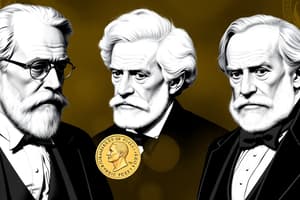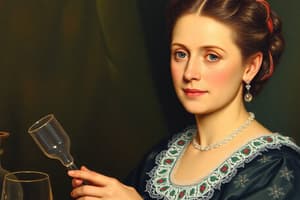Podcast
Questions and Answers
What significant discovery is Wilhelm Röntgen credited with in 1895?
What significant discovery is Wilhelm Röntgen credited with in 1895?
- Serum therapy.
- Classical conditioning.
- The structure of the atom.
- X-rays. (correct)
What phenomenon does Pavlov's research demonstrate?
What phenomenon does Pavlov's research demonstrate?
- Classical conditioning. (correct)
- Organic evolution.
- Atomic structure.
- Electromagnetic radiation.
Kitasato Shibasaburo is known for developing a treatment for which diseases?
Kitasato Shibasaburo is known for developing a treatment for which diseases?
- Influenza and smallpox.
- Measles and mumps.
- Malaria and tuberculosis.
- Tetanus and diphtheria. (correct)
What concept related to chaos theory did Henri Poincaré introduce?
What concept related to chaos theory did Henri Poincaré introduce?
J. J. Thomson's plum pudding model proposed what about atomic structure?
J. J. Thomson's plum pudding model proposed what about atomic structure?
What was Svante Arrhenius's significant contribution to climate science?
What was Svante Arrhenius's significant contribution to climate science?
Annie Jump Cannon is most noted for her work in which field?
Annie Jump Cannon is most noted for her work in which field?
Henrietta Swan Leavitt's work significantly impacted which astronomical measurement?
Henrietta Swan Leavitt's work significantly impacted which astronomical measurement?
What was Harriet Brooks's crucial finding in nuclear physics?
What was Harriet Brooks's crucial finding in nuclear physics?
What did Srinivasa Ramanujan achieve despite limited formal training?
What did Srinivasa Ramanujan achieve despite limited formal training?
Erwin Schrödinger's wave equation revolutionized the understanding of which area of physics?
Erwin Schrödinger's wave equation revolutionized the understanding of which area of physics?
What was the main outcome of the experiments conducted by Harold Urey and Stanley Miller in 1953?
What was the main outcome of the experiments conducted by Harold Urey and Stanley Miller in 1953?
What does classical conditioning rely on, as discovered by Pavlov?
What does classical conditioning rely on, as discovered by Pavlov?
What aspect of atomic theory did J. J. Thomson's work help to pave the way for?
What aspect of atomic theory did J. J. Thomson's work help to pave the way for?
Flashcards are hidden until you start studying
Study Notes
Wilhelm Conrad Röntgen
- Discovered X-rays in 1895
- X-rays pass through human skin, but are blocked by metal and bone
- Awarded the first Nobel Prize in Physics in 1901
Ivan Pavlov
- Russian physiologist, famous for research on digestive secretions in dogs
- Developed the concept of classical conditioning
- The "Pavlov" response: dogs learning to associate the arrival of food with the sound of a bell
- Won the Nobel Prize in Physiology or Medicine in 1904
Kitasato Shibasaburo
- Japanese physician and bacteriologist
- Discovered serum therapy to protect against tetanus and diphtheria
- Showed that tetanus serum injections confer immunity
Jules Henri Poincaré
- French mathematician and physicist
- Found that small changes in initial conditions often cause large, unpredictable outcomes - this is known as chaos theory
- His ideas about chaos theory were initially overlooked
- He also wrote extensively on electromagnetism, influencing Einstein's work on relativity
J.J. Thomson
- English physicist
- Identified "corpuscles" (later called electrons) using a cathode ray tube
- The particles had a negative electrical charge, and were much lighter than a hydrogen atom
- Thomson's "plum pudding model" proposed that every atom has a positive charge spread throughout it, with electrons embedded within
- His discoveries revolutionized theories about atoms and electricity
- Confirmed the existence of isotopes
Svante Arrhenius
- Swedish scientist who studied physics
- Suggested that ice ages may have been caused by fewer volcanic eruptions
- He linked human activity with rising global temperatures, highlighting the importance of fossil fuel emissions
- This paved the way for modern concerns about climate change
Annie Jump Cannon
- American astronomer
- Pioneered the classification of stars, creating a system that formed the basis of the Harvard Spectral Classification system
- Classified over 350,000 stars in her career
Henrietta Swan Leavitt
- American astronomer
- Discovered that Cepheid variable stars pulsate with a regular pattern of brightness, which is important for measuring distances to them
- This work was crucial for measuring the distance between Earth and other galaxies
- Discovered more than 2,400 variable stars
Harriet Brooks
- Canadian physicist
- First female nuclear physicist in Canada
- Discovered that one element could change into another through nuclear decay
- Worked in Marie Curie's laboratory in Paris
Srinivasa Ramanujan
- Indian mathematician
- Made significant contributions to mathematical analysis and number theory
- Invited to Cambridge based on his work
- Awarded a Bachelor of Science degree and became a Fellow of the Royal Society
Erwin Schrödinger
- Austrian physicist
- Developed the wave equation which offered a new understanding of how particles like electrons behave
- The wave equation changed the way we see the world and formed the basis for quantum mechanics
Ronald Fisher
- British statistician and geneticist
- Pioneered the use of statistics in scientific experiments
- Reconciled Darwin's theory of natural selection with Gregor Mendel's experiments
Harold Urey and Stanley Miller
- American chemists who simulated early Earth conditions in the laboratory
- They showed that complex, carbon-based compounds could be produced from simple molecules under specific conditions, which is crucial for the origin of life
Studying That Suits You
Use AI to generate personalized quizzes and flashcards to suit your learning preferences.





